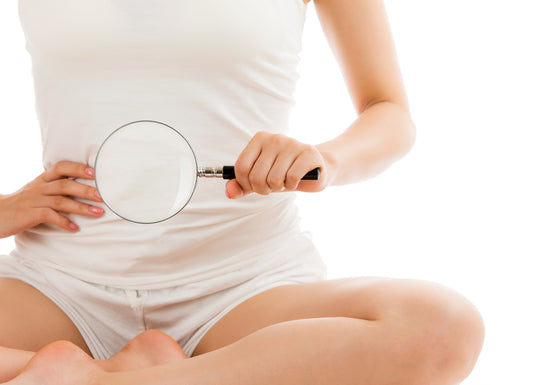When using dilators, lubricant is not just recommended but is considered a vital part of the process. Vaginal dilating can be challenging to start with, particularly for women diagnosed with vaginismus or pelvic floor dysfunction, however, using lube with your dilator will make the process far more comfortable.
What Is A Vaginal Dilator Used For?
Vaginal dilators, which are also referred to as vaginal trainers, are tube-shaped instruments used to gently stretch a narrowed or tight vagina, as well as to relax and strengthen pelvic floor muscles. In some cases, the vagina can become tight due to a lack of estrogen during menopause, and the formation of fibrous tissue, known as vaginal stenosis, is also a culprit.
Vaginismus, which causes a spontaneous and uncontrollable spasming of the vaginal muscles, is another condition that benefits from the use of vaginal dilators. They also help to relax vaginal muscles after brachytherapy to treat cervical cancer, childbirth tissue tears, or pelvic injuries.
In addition to medical conditions, anxiety or psychological blocks can also result in a fear of vaginal penetration, which ultimately leads to a lack of natural lubrication and painful intercourse. Fear of sex as a teenager, for example, negative feelings about sex after sexual abuse, or worry about penetration following a pelvic injury can all have an impact on the vaginal muscles.
How Do Vaginal Lubricants Work?
Vaginal lubricants work to reduce dryness, itching, chaffing, and friction by adequately moistening the skin. When applied to the vulva before intercourse, for instance, lube makes penetration easier, reduces pain during sex, and heightens the intensity of female orgasms.
How Does Lube Help With Vaginal Dilators?
When using a vaginal dilator is first recommended, many women feel nervous about it, which makes perfect sense. Women who benefit from vaginal dilators are often those who feel the most trepidation at the thought of inserting something into their vagina.
Using lubrication, however, makes insertion of the dilator much easier and far more comfortable. In fact, using a vaginal dilator without lube will almost certainly result in friction and soreness. This, in turn, only adds to the anxiety surrounding penetration, thereby reinforcing the feeling that penetration or intercourse is painful.
Remember, the aim of using vaginal dilators is to gently stretch the vagina and gradually work on relaxing the muscle spasms so that penetration is no longer painful and sex becomes as fun and joyful as it should be. Giving yourself a helping hand by always using lube with your dilator will ensure slow and deep healing of the vaginal tissues.
What Are the Different Types of Lubes?
Lubricants are commonly available in three types; water-based, oil-based, or silicone-based.
1. Oil-based lubricants
Like edible household products such as cooking oils or kitchen oils are long-lasting, convenient, and considered safe for the body and the vagina. Yet synthetic oil-based lubricants like petroleum jelly are known to cause skin irritation, clogged pores, and stain bed sheets. Another drawback of oil-based lubricants is that they are known to react with latex and reduce the effectiveness of condoms.
2. Silicone-based lubricants
These are also long-lasting and are an excellent solution for vaginal dryness or atrophy. On the downside, however, they can be too greasy for some, difficult to wash from skin and fabrics, and can damage silicone dilators.
3. Water-based lubricants
These are the most common and come with or without glycerine. They are usually smooth without being too sticky, they won’t stain bed sheets or towels, and they are easy to wash from the skin. The only drawback is that due to their rapid absorption into the skin tissues, water-based lubricants sometimes need re-applying when sexual encounters last for longer.
Best Lubes for Dilators
According to women’s health experts and pelvic floor therapists, the best lubes for dilators are water-based. Generally made from natural ingredients, water-based lubricants are safe to use on sensitive skin as well as silicone dilators. They are also smooth and non-sticky, making them easy to wash off your hands, dilators, and fabrics after use.
Although water-based lubes absorb into the skin and might need re-applying during longer sex sessions, their time frame fits well with vaginal dilators, and reapplication is not usually required.
For example, Velvet Rose Water-Based Personal Lubricant from Intimate Rose is not only a safe, toxin-free, and effective solution to vaginal dryness, it is also designed to pair perfectly with our medical-grade silicone vaginal dilators. With a silky smooth finish that won’t stain your fabrics, just a little drop of this FDA-cleared lubricant will go a long way, so the 8oz bottle should last a long time.
How To Use Lube with A Dilator
The easiest way to apply lube when using a dilator is to rub a little on the entrance to your vagina and a little more on the head of the dilator to ensure a relaxed ‘slide-in’ insertion. Don’t worry about using too much in the beginning, you’ll soon work out the required amount.
For those who find lube a bit messy and have no desire to feel it on their hands, lube can be dribbled onto the dilator directly from the bottle. Alternatively, squirt some lube onto a sheet of kitchen roll, or clean paper, wrap it around the dilator and ensure the shaft is completely coated.
Is Vaginal Moisturizer The Same As Lubricant?
No. While vaginal moisturizers help to moisten the skin and prevent itching or irritation, they absorb much quicker than a water-based lubricant. Because of this, vaginal moisturizers rarely offer enough moistness to ease discomfort during vaginal penetration with a dilator or sexual intercourse.
When using your dilator, always ensure you use an FDA-approved lubricant to avoid irritation, chaffing, and friction.
Conclusion
Safe, toxin-free lubrication is essential when using vaginal dilators to stretch, strengthen, or relax the vaginal muscles. The process is designed to slowly and gently restore vaginal tissues and is best performed when the vagina is moist and relaxed.
If vaginal or pelvic discomfort is affecting your sex life, consider scheduling an appointment with your doctor or a pelvic health physiotherapist for a check-up. In addition to helping you to understand your condition, they can recommend the most suitable vaginal dilator therapy to relieve your discomfort.
References
Healthline – Vaginal Dilators - https://www.healthline.com/health/womens-health/vaginal-dilators#conditions-they-treat
My Health Alberta – Female Sexuality & Cancer – Vaginal Dilators After Radiation Therapy - https://myhealth.alberta.ca/cancer-and-sexuality/female-sexuality-and-cancer/vaginal-tightness/vaginal-dilators
My Cleveland Clinic – Vaginismus - https://my.clevelandclinic.org/health/diseases/15723-vaginismus
Health System, University of Michigan - Vaginal Lubricants, Moisturizers,
Dilators & Counseling - https://www.med.umich.edu/1libr/PMR/SexualHealth/lubricants.pdf
Medical News Today – What to Know About Vaginal Lubrication - https://www.medicalnewstoday.com/articles/326450



